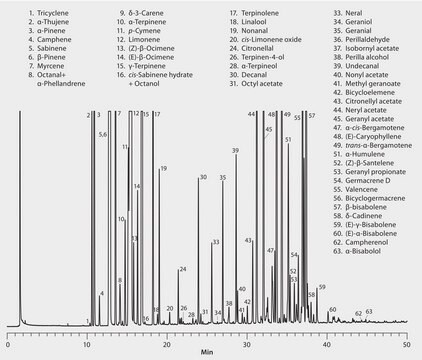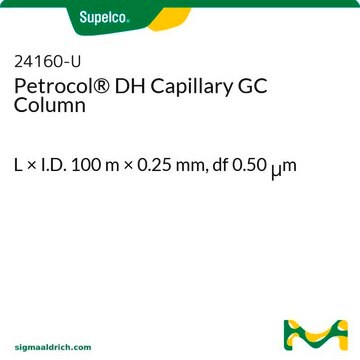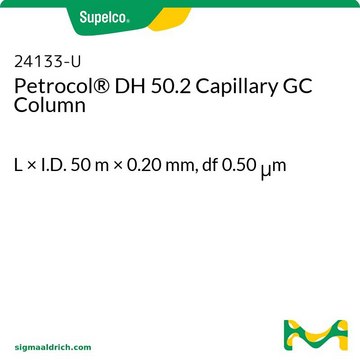25337
Petrocol® EX2887 Capillary GC Column
L × I.D. 5.0 m × 0.53 mm, df 0.10 μm
Synonym(s):
FS CAP Petrocol® EX 2887 5M 0.1UM .53MM (48273)
Sign Into View Organizational & Contract Pricing
All Photos(1)
About This Item
UNSPSC Code:
41115710
eCl@ss:
32119290
Recommended Products
material
fused silica
Quality Level
agency
ASTM® D2887,D7213
meets requirements for USP G1, G2 and G9
parameter
≤25-380 °C temperature (isothermal or programmed)
Beta value
1325
df
0.10 μm
technique(s)
gas chromatography (GC): suitable
L × I.D.
5.0 m × 0.53 mm
matrix active group
Bonded; poly(dimethyl siloxane) phase
application(s)
petroleum
column type
capillary non-polar
General description
Capillary GC column is also known as open tubular column. The carrier gas flows through the central aperture and is unrestricted throughout the length of the column.
Application: This column is designed for ASTM D2887 (simulated distillation [Sim Dis] of petroleum fractions) for samples having boiling points greater than 1000 °F.
USP Code: This column meets G1, G2, and G9 requirements.
Phase:
USP Code: This column meets G1, G2, and G9 requirements.
Phase:
- Bonded
- Poly(dimethyl siloxane)
- Subambient to 380 °C (isothermal or programmed)
Application
Petrocol® EX2887 Capillary Column was used during GC analysis, done in an experiment conducted to identify the organic substances as contaminanats, which were priorily used as lubricants during the manufacturing of alumninum containers. It was also used, to characterize Whiterocks and PR spring bitumens.
Other Notes
We offer a variety of chromatography accessories including analytical syringes
Legal Information
ASTM is a registered trademark of American Society for Testing and Materials
Petrocol is a registered trademark of Merck KGaA, Darmstadt, Germany
Choose from one of the most recent versions:
Already Own This Product?
Find documentation for the products that you have recently purchased in the Document Library.
Identification of organic contaminants in disposable aluminium foil containers
Food Additives and Contaminants, 23 (10), 1030-1037 (2006)
Compositional analysis of bitumen and bitumen-derived products
Subramanian M
Journal of Chromatographic Science, 34 (1), 20-26 (1996)
A K Punetha et al.
Journal of chromatographic science, 40(7), 377-382 (2002-08-31)
The estimation of olefinic content in conversion processes such as the etherification of olefins in fluid catalytic cracking (FCC) gasoline is essentially required. Gas chromatography (GC) is the well-established method for the quantitative analysis of olefins in etherification processes. The
Scott RPW.
Introduction to Analytical Gas Chromatography, 101-102 (1997)
Our team of scientists has experience in all areas of research including Life Science, Material Science, Chemical Synthesis, Chromatography, Analytical and many others.
Contact Technical Service





